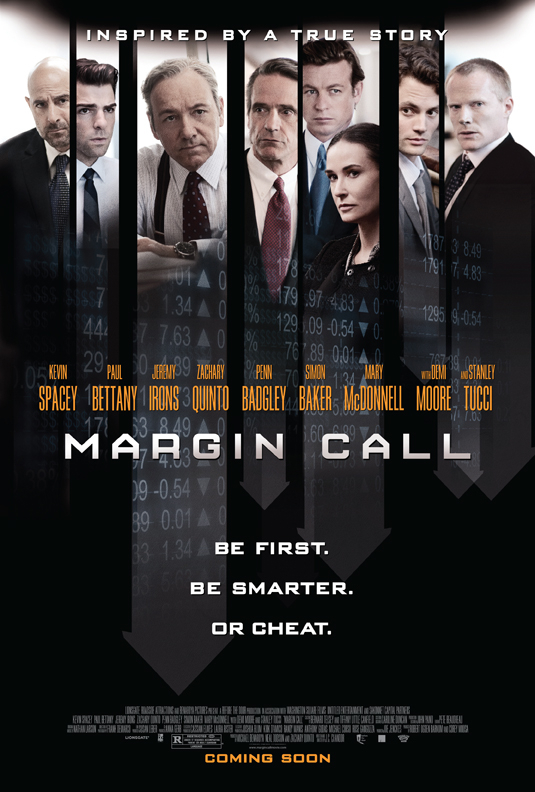MARGIN CALL
(director/writer: J. C. Chandor; cinematographer: Frank DeMarco; editor: Pete Beaudreau; music: Nathan Larson; cast: (Sam Rogers), Paul Bettany (Will Emerson), (John Tuld), Zachary Quinto (Peter Sullivan), Penn Badgley (Seth Bregman), Simon Baker (Jared Cohen), (Sarah Robertson), (Eric Dale), Mary McDonnell (Mary Rogers); Runtime: 106; MPAA Rating: R; producers: Joe Jenckes/Michael Benaroya/Robert Odgen Barnum/Neal Dodson/Corey Moosa/; Lionsgate/Roadside Attractions; 2011)
“The entertainment value is high.“
Reviewed by Dennis Schwartz
The debut feature, a boardroom thriller sharply written and directed by J. C. Chandor, chronicles 36 hours of a rapidly developing economic collapse at an unnamed reputable Manhattan investment firm, not unlike Lehman Brothers, at the onset of the 2008 financial market crash caused by white-collar crime. The screenplay is formulaic even if smart, while the acting is superb, the presentation is well-crafted and the entertainment value is high. Problem is that the cynical pic wants us to be sympathetic to the overpaid obscenely wealthy Wall Street types, who find rational excuses for cheating the system and fucking all over the investors and innocent citizens. These greedy Wall Street twits go into excited speechifying outbursts explaining how their corrupt actions can be justified because they have so little choice and there is no way for them to refuse the big money offered them to play capitalist ball. Despite an effort to generate sympathy for the few Wall Street bosses who try to do the honest thing but can’t because they’re trapped in a bad system, it’s still not possible to root for them without gagging.
The pic opens as efficiency experts are brought into an unnamed Manhattan firm to lay off about 80% of the company’s workforce. Nice guy veteran company man, top risk analyst, Eric Dale (Stanley Tucci), is treated like shit and ordered to immediately clear out of the premise and advised to accept the severance package at once or forfeit it. Before departing, Eric hands his brilliant young analyst protégé , Peter Sullivan (Zachary Quinto), one of the firm’s survivors, a flash drive file in need of further checking because it shows after crunching the numbers that the company is broke through bogus trading practices in the real-estate field.
That night, after Peter lets the newly promoted boss, Will Emerson (Paul Bettany), know about the impending crisis, Will goes up the chain of command to inform top exec Sam Rogers (Kevin Spacey). Next boss up the ladder is the fifty-something Sam’s arrogant younger 43-year-old smarmy but cunning boss Jared Cohn (Simon Baker) and also Jared’s rival, the lone female bigwig, the firm’s unsmiling and always on guard from attacks by the male culture boardroom, the chief risk officer Sarah Robertson (Demi Moore). After the bosses hear Peter’s crisp analysis of the situation, explaining it in layman’s terms, at 4 a.m. the firm’s imperious CEO, John Tuld (Jeremy Irons), flown in by helicopter to handle crisis intervention and do damage-control, arrives at his solution–to have the firm sell something they know has no value and screw everyone else so you can still make money from your bad decision.
The twenty-something analysts, Peter and colleague Seth (Penn Badgley), stuck with the bosses all night, just want to survive the games played and are only on board because they aspire to make a pile of money out of their work experience. Irons is pictured as the ultimate corporate survivor, who tries to blur the ethical lines and could be the poster boy for corporate malfeasance. Spacey, as the pic’s moral compass point, gives the best performance as the sarcastic boss of the traders, who shrewdly knows how to mask his true feelings to manipulate others but knows what he’s doing is not right even if it’s rewarding monetarily. The film leaves us with the rancid message how capitalism has progressed to the point where hard work and having a good product is no longer valued on the Street as much as being successful (even if as a shady operator) and making more money than one’s rivals. There’s no subtle message here, everything is said aloud and the viewer is expected to agree with the film-maker or else is missing what anti-capitalist film is all about. this
this
REVIEWED ON 11/30/2011 GRADE: B